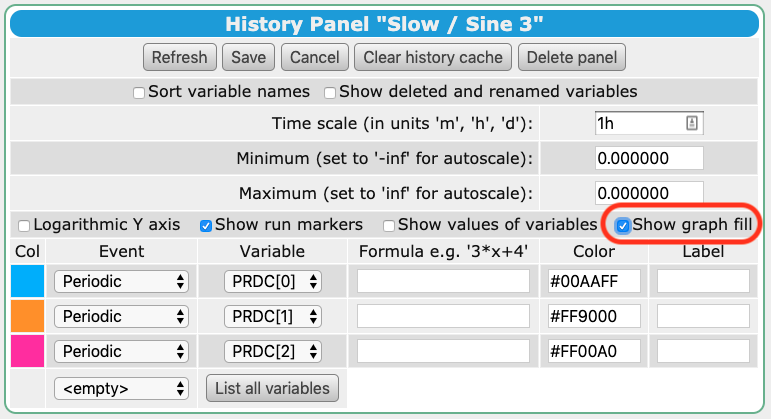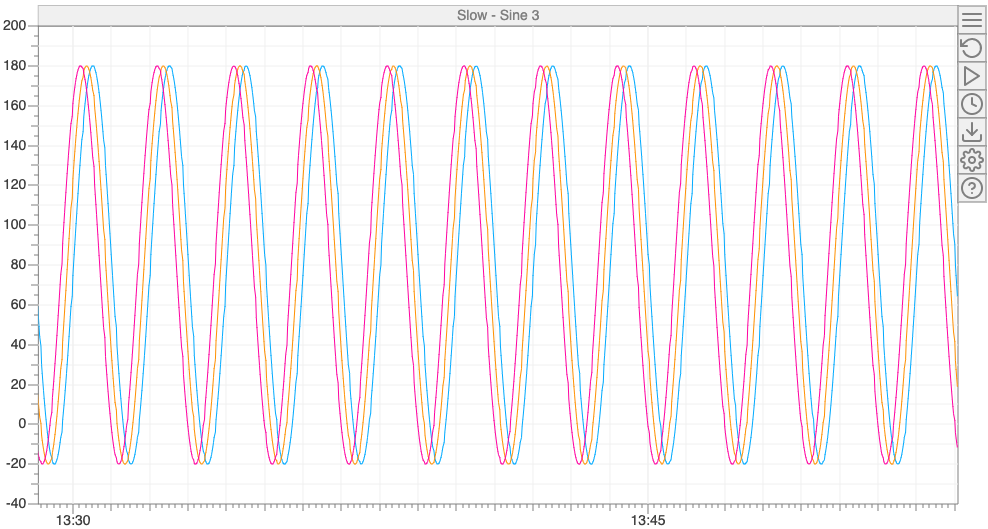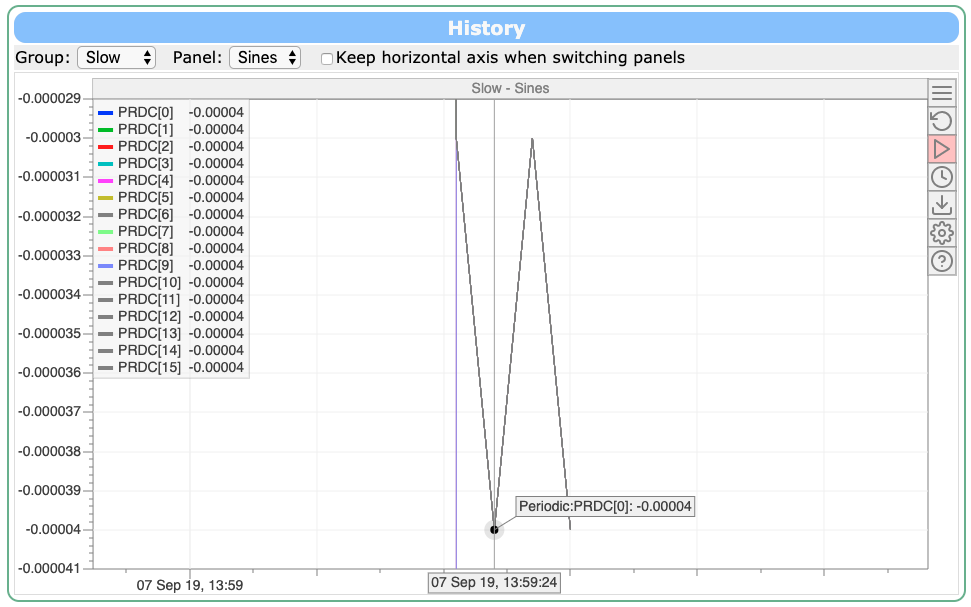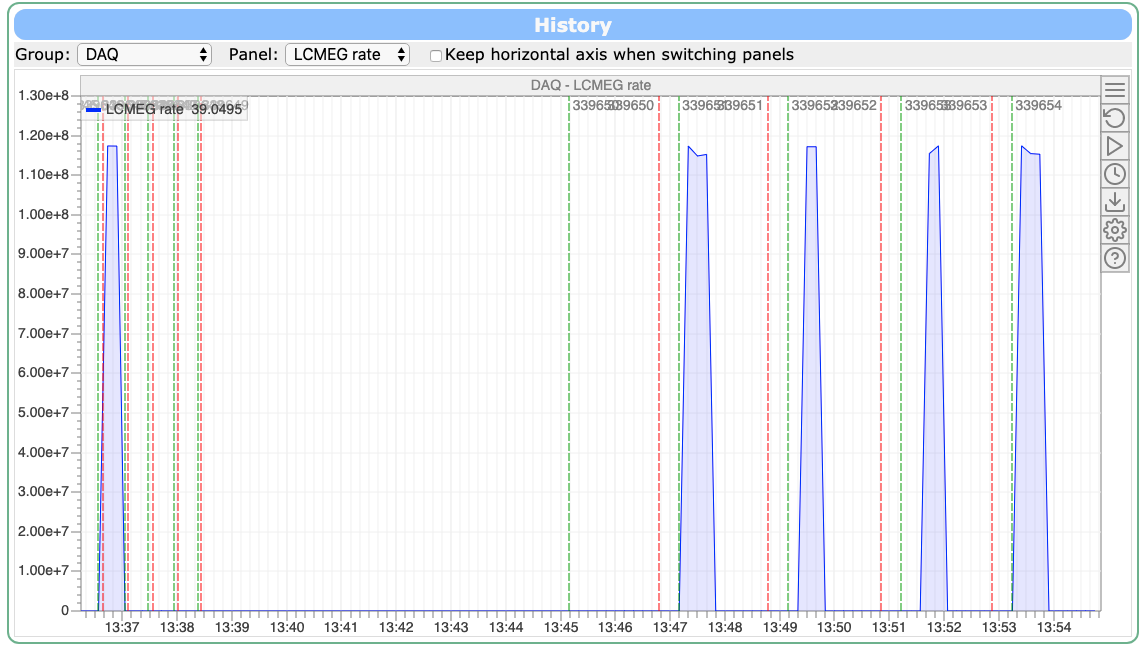| ID |
Date |
Author |
Topic |
Subject |
|
1674
|
06 Sep 2019 |
Stefan Ritt | Info | New history plot facility | > 1) it would be nice to have an option to format the label output (see attachment 1)
That's clearly a bug, I will fix it.
> 2) the background of a history plot is very handy if you only show one measure.
> If you have multiple ones (see attachment 2), this is not the case anymore. It
> would be nice if the background could be enabled/disabled.
Looking at your plot, even without the background things look messy. Please note
that you can display only a single curve by double clicking on it (and back with Escape).
If all curves are on top of each other, you can get them apart a bit by zooming
in to the vertical axis, then double click. Let ma know if that works for you.
Best regards,
Stefan |
|
Draft
|
07 Sep 2019 |
Stefan Ritt | Info | New history plot facility | > This I found out, yet the attachment here shows another case where it would be useful to be
> able to disable the background, namely if you have positive and negative measures in one
> plot. Somehow it suggests that CH1 and CH2 show very different values, whereas it is only a
> difference in the sign of this variables.
Ok, I added
- a correction which does the fill not to the bottom of the window, but only to the y=0 axis.
- a flag "Show graph fille" which lets you turn on and off the filling for each plot
Best,
Stefan |
|
1678
|
07 Sep 2019 |
Stefan Ritt | Info | New history plot facility | > This I found out, yet the attachment here shows another case where it would be useful to be
> able to disable the background, namely if you have positive and negative measures in one
> plot. Somehow it suggests that CH1 and CH2 show very different values, whereas it is only a
> difference in the sign of this variables.
Ok, I added an option which lets you switch off the background.
I also changed the background drawing such that it only goes to the y=0 axis, not the bottom of the screen.
That should help displaying negative values.
Stefan |
| Attachment 1: Screenshot_2019-09-07_at_13.52.49_.png
|

|
| Attachment 2: Slow-Sine_3-20198107-132905-20198107-135305.png
|

|
|
1679
|
08 Sep 2019 |
Stefan Ritt | Info | New history plot facility | > 1) it would be nice to have an option to format the label output (see attachment 1)
I fixed that in the current version.
Stefan |
| Attachment 1: Screenshot_2019-09-08_at_12.29.12_.png
|

|
|
1683
|
12 Sep 2019 |
Stefan Ritt | Info | History panels in custom pages | Indeed there was a bug in some JavaScript code, which I fixed here: https://bitbucket.org/tmidas/midas/commits/d2b1a783240e252820c622001e15c09c5d7798c0
Note that your code will bring you the "old style" history panels (with GIF images). If you want the new style (interactive canvas panels), you need the following:
1) Add
<script src="mhistory.js"></Script>
to the top of your custom page
2) Add "mhistory_init();" to the "onload" function of your page, like
<body class="mcss" onloas="mhttpd_init('Example');mhistory_init();">
3) Change the class of the panel from "mhistory" to "mjhistory", like
<div class="mjshistory" data-group=...>
Best regards,
Stefan |
|
1690
|
16 Sep 2019 |
Stefan Ritt | Info | New history plot facility | > Also the new system is still incomplete, i.e. there is no trivial way to save a history plot into a file:
That has been implemented in meantime. Just click on the download arrow and you can save the current window in CSV or PNG format.
Stefan |
|
1702
|
26 Sep 2019 |
Stefan Ritt | Forum | Open a hotlink to a single element in an ODB array |
| Pintaudi Giorgio wrote: | Hello!
Just a little question about the ODB hotlinks. Is it possible to open a hotlink
to a single element in and ODB array? |
Yes it is with the now preferred function db_watch(). Following program will open a hot link to the /Experiment/Run number:
#include <stdio.h>
#include "midas.h"
int run_number;
void run_number_changed(HNDLE hDB, HNDLE hKey, int i, void *info)
{
int run_number, size;
/* get run number */
size = sizeof(run_number);
db_get_data(hDB, hKey, &run_number, &size, TID_INT);
printf("Run number is %d\n", run_number);
}
main()
{
HNDLE hKey;
/* connect to experiment */
cm_connect_experiment("", "", "ODB Test", NULL);
/* open hot link to run number */
db_find_key(1, 0, "/runinfo/run number", &hKey);
db_watch(1, hKey, run_number_changed, NULL);
/* enter idle loop */
while (cm_yield(1000); != RPC_SHUTDOWN);
cm_disconnect_experiment();
return 1;
} |
|
1720
|
06 Oct 2019 |
Stefan Ritt | Bug Report | History data size mismatch | I wonder why do you this via ODB links. The "standard" way of writing to the history should be to create events for an equipment and flag this equipment as being written to the
history. All variables under /Equipment/<name>/Variables then automatically go into the history and you don't have to worry about ODB links. Only variables not fitting the
equipment/variables scheme should be dealt with via ODB links, like variables under equipment/statistics or parameters in another ODB tree. In a typical midas experiment, only
very few variables typically go into the 'System' event. This is however probably not a solution to your problem. If you have a similar structure (doubles plus an odd number of floats)
under 'variables', you might get the same error. I'n in contact with KO to fix this problem at the root level.
Stefan
> Logging a list of variables to the history via links in the history ODB subtree,
> we get messages as follows at every run start:
>
> 19:43:24.009 2019/10/06 [Logger,ERROR] [history_schema.cxx:2676:hs_write_event,ERROR] Event 'System' data size mismatch: expected 412 bytes, got 416 bytes
>
> 19:43:24.008 2019/10/06 [Logger,ERROR] [history_schema.cxx:2676:hs_write_event,ERROR] Event 'System' data size mismatch: expected 412 bytes, got 416 bytes
>
> 19:43:23.850 2019/10/06 [Logger,ERROR] [history_schema.cxx:455:hs_write_event,ERROR] Event 'System' data size mismatch count: 25, expected 412 bytes, hs_write_event() called with as much as 416 bytes
>
> 19:43:23.850 2019/10/06 [Logger,ERROR] [history_schema.cxx:455:hs_write_event,ERROR] Event 'System' data size mismatch count: 25, expected 412 bytes, hs_write_event() called with as much as 416 bytes
>
> The history calculates the size of a record from the size of the individual variables, (history_schema.cxx, L2666 ff), whereas the ODB delivers the data aligned/padded to the size of the largest value in the record.
> In our history, a long list of doubles (64 Bit) fas followed by three floats (32 bit), leading to a padded response from the ODB, 4 byte longer than the history expects.
> Quick fix: Add another 32 bit dummy variable to the history. Gets rid of the error messages...
> Should probably be fixed at a deeper level... |
|
1723
|
10 Oct 2019 |
Stefan Ritt | Bug Report | History data size mismatch | > Yes, we could have
> kept that apart, yes, in this case a double would also work (and not break things), but a bug is a bug...
> I could think of senisble use cases where doubles and ints are mixed and I also know quite a few areas where it makes
> sense to use floats...
I agree with Nik that we should fix this on the midas level. Since it happens in history_schema.cxx which was written by KO, maybe he can have a look.
Stefan |
|
1724
|
14 Oct 2019 |
Stefan Ritt | Bug Report | lazylogger in cmake & max_event_size | > > The compile option -DHAVE_FTPLIB checked in mdsupport.cxx disappeared if you
> > compile with cmake.
>
> Hi, Stefan - do we still need to support FTP in the logger? In the lazylogger, special support for
> FTP is not needed, they can you the "script" method and do FTP without our help.
>
> I move to remove FTP support from MIDAS. (second? other opinions?)
I oppose to remove FTP support from lazylogger. We still use it heavily at PSI. In comparison to the "script" method, it
shows the current speed in MB/s which helps us to diagnose some network problem by writing this number into the
history. The "script" method only give you an integral transfer speed after a file has be completely written.
I'm however not sure who FTP is used in lazylogger. It goes into mdsupport.cxx and I seem to remember that Pierre
wrote the FTP code by hand, so no external library is necessary.
Stefan |
| Attachment 1: Screenshot_2019-10-14_at_13.54.53_.png
|

|
|
1726
|
15 Oct 2019 |
Stefan Ritt | Suggestion | recover daq and hardware safety. | There is a not-so-well-known function in the ODB to write protect some keys. You can do
odbedit> chmod 1 /Equipment/HV/Demand
which will write protect your Demand values. You see that by doing
odbedit> ls -ls
where you only see a "R" at the right end instead a "RWD". I haven't tried it yet (so better do a dry run yourself), but that should prevent an odb load to overwrite your demand values. To change the values, put some logic on a custom page to unprotect the
values, change them, and then protect them again.
Stefan |
|
1735
|
15 Nov 2019 |
Stefan Ritt | Suggestion | javascript comunication | Very good idea. And thanks for finding the document.hidden solution. I put it in, so give it a try.
Best,
Stefan
> I am currently testing the new history system on the mhttpd side and stumbled over the following issue: typically our user open a lot of midas web-page tabs and keep them open. With the current version this leads after a night typically to a state where the browser is busy with itself and not reacting anymore.
>
> One important reason seems to be that ALL tabs trying to communicate all the time which is totally unnecessary, since I think a hidden tab should stay in a sleeping mode.
>
> I was browsing if there is a way to find out if a tab is active or not, and found the following API which exactly does this:
>
> https://developer.mozilla.org/en-US/docs/Web/API/Page_Visibility_API
>
> Furthermore, the simple
>
> document.hidden
>
> tag, could be used to find out if the page is currently active.
>
> Wouldn't it a good idea to send all midas tabs which are not active into a sleep mode and only reactivate them if they come into focus?
>
> I had a quick look at the JavaScript libs of midas, but I am not quite certain where to best inject this. |
|
1739
|
18 Nov 2019 |
Stefan Ritt | Suggestion | javascript comunication | > Hi, Stefan - I did not look at your code, if all midas tabs are inactive, will the alarm sound still play?
Nope. All updates are done in mhhtpd_refresh(), and I changed it such that nothing is updated if hidden.
I agree however that this is bad. You want to hear alarms always. So I added some code to do ONLY alarm updates if in the background.
No GUI changes, only audio playing. Checking is reduced from 1 Hz to 0.1 Hz (once every 10 seconds). I don't have however a solution
to your problem "not enough interaction with page" which I have never seen so far.
I wonder if we should try push notifications: https://developers.google.com/web/fundamentals/codelabs/push-notifications
which seems a bit complicated to me. It might also be too subtle if someone is sleeping in front of the computer.
Stefan |
|
1740
|
18 Nov 2019 |
Stefan Ritt | Suggestion | javascript comunication | > a) google chrome slows down the execution of javascript in inactive tabs, leading to trouble
> with memory management - midas pages poll at 1/sec, each poll allocates memory for processing RPC messages,
> and (until recently) allocates memory for new DOM objects to update the web page - but the garbage collector
> gets slowed down and does not keep up - leading to huge memory use (up to 200 Mbytes) for inactive midas pages
> that normally consume 50-ish Mbytes.
Try my latest change, which drops any update if hidden, except the alarm sound. At the moment this only works on the main "status" page.
> most midas web pages poll in two places - mhttpd_refresh() updates the current date timestamp, alarms, currently active midas.log message;
> and each page has it's own loop for updating it's own data (i.e. "alarms" page, "programs" page).
That's correct. I changed mhttpd_refresh() now and the main loop for the "status" page. If that works for everybody, we can do that also for "programs" and other pages. The code is here:
if (document.hidden) {
// don't update page if hidden
setTimeout(update_page, 500);
return;
}
where "update_page" has to be replaced with the proper function.
Stefan |
|
1743
|
28 Nov 2019 |
Stefan Ritt | Bug Report | midas alarm sound unreliable in google-chrome | The document
https://docs.google.com/document/d/1_278v_plodvgtXSgnEJ0yjZJLg14Ogf-ekAFNymAJoU/edit
says that the "... playback must be at lest 7 seconds long" to signal significant playback.
I attached a modified alarm sound file with 3 seconds of sound followed by 5 seconds of silence. Try that one and let me know if this changes anything. If successful, I can modify the
other sound files as well.
Stefan |
| Attachment 1: beep.mp3
|
|
1773
|
14 Jan 2020 |
Stefan Ritt | Forum | frontend issues with midas-2019-09 | We updated midas/examples/experiment/frontend.cxx to correctly contain
/*-- Interrupt configuration ---------------------------------------*/
INT interrupt_configure(INT cmd, INT source, POINTER_T adr)
{
switch (cmd) {
case CMD_INTERRUPT_ENABLE:
break;
case CMD_INTERRUPT_DISABLE:
break;
case CMD_INTERRUPT_ATTACH:
break;
case CMD_INTERRUPT_DETACH:
break;
}
return SUCCESS;
}
but if you upgrade from C to C++ from your own old frontend code you might be hit by that issue.
Maybe Konstantin can update elog:1526 to contain a hint about "INT source".
Stefan |
|
1774
|
14 Jan 2020 |
Stefan Ritt | Forum | frontend issues with midas-2019-09 | Actually now I see that
a4) poll_event() and interrupt_configure() have "source" as "int[]" instead of "int" (why did this work before?)
mention this already, but maybe it's not completely clear that one has to change "int[] source" to "int source"
Stefan
> We updated midas/examples/experiment/frontend.cxx to correctly contain
>
> /*-- Interrupt configuration ---------------------------------------*/
>
> INT interrupt_configure(INT cmd, INT source, POINTER_T adr)
> {
> switch (cmd) {
> case CMD_INTERRUPT_ENABLE:
> break;
> case CMD_INTERRUPT_DISABLE:
> break;
> case CMD_INTERRUPT_ATTACH:
> break;
> case CMD_INTERRUPT_DETACH:
> break;
> }
> return SUCCESS;
> }
>
> but if you upgrade from C to C++ from your own old frontend code you might be hit by that issue.
>
> Maybe Konstantin can update elog:1526 to contain a hint about "INT source".
>
> Stefan |
|
1775
|
14 Jan 2020 |
Stefan Ritt | Forum | cmake complie issues | Thanks for tracing the problem further down. Now I realized that the CMakeLists.txt for the ROOT analyzer did not contain the usual ROOT flags. I added that and committed the change, so please try again. Here is the diff:
examples/experiment/CMakeLists.txt:
execute_process(COMMAND root-config --incdir OUTPUT_VARIABLE ROOT_INC)
execute_process(COMMAND root-config --libs OUTPUT_VARIABLE ROOT_LIBS)
+ execute_process(COMMAND root-config --cflags OUTPUT_VARIABLE ROOT_CFLAGS)
string(STRIP ${ROOT_LIBS} ROOT_LIBS)
- string(REGEX REPLACE "\n$" "" ROOT_INC "${ROOT_INC}")
+ string(REGEX REPLACE "\n" "" ROOT_INC ${ROOT_INC})
+ separate_arguments(ROOT_CFLAGS UNIX_COMMAND "${ROOT_CFLAGS}")
set(CMAKE_CXX_STANDARD 11)
target_include_directories(analyzer PUBLIC ${ROOT_INC} ${INC_PATH})
+ target_compile_options(analyzer PUBLIC ${ROOT_CFLAGS})
target_link_libraries(analyzer rmana midas ${ROOT_LIBS} ${LIBS})
Best,
Stefan
> Re: ROOT problem
>
> I looked into how my ROOT based MIDAS analyzer compiles. It is using the flag -std=c++14.
> MIDAS cmake compiles with -std=gnu++11 with the result:
>
> 29%] Building CXX object CMakeFiles/rmana.dir/src/mana.cxx.o
> /usr/bin/c++ -D_LARGEFILE64_SOURCE -I/home/pkunz/packages/midas/include -I/home/pkunz/packages/midas/mxml -I/usr/include/root -O2 -g -DNDEBUG -DHAVE_ZLIB -DHAVE_FTPLIB -Wall -Wformat=2 -Wno-format-nonliteral -Wno-strict-aliasing -Wuninitialized -Wno-unused-function -DHAVE_ROOT -std=gnu++11 -o CMakeFiles/rmana.dir/src/mana.cxx.o -c /home/pkunz/packages/midas/src/mana.cxx
> In file included from /usr/include/root/TString.h:28,
> from /usr/include/root/TCollection.h:29,
> from /usr/include/root/TSeqCollection.h:25,
> from /usr/include/root/TList.h:25,
> from /usr/include/root/TQObject.h:40,
> from /usr/include/root/TApplication.h:30,
> from /home/pkunz/packages/midas/src/mana.cxx:60:
> /usr/include/root/ROOT/RStringView.hxx:32:37: error: ‘experimental’ in namespace ‘std’ does not name a type
> 32 | using basic_string_view = ::std::experimental::basic_string_view<_CharT,_Traits>;
>
>
> If I change this to
>
> /usr/bin/c++ -D_LARGEFILE64_SOURCE -I/home/pkunz/packages/midas/include -I/home/pkunz/packages/midas/mxml -I/usr/include/root -O2 -g -DNDEBUG -DHAVE_ZLIB -DHAVE_FTPLIB -Wall -Wformat=2 -Wno-format-nonliteral -Wno-strict-aliasing -Wuninitialized -Wno-unused-function -DHAVE_ROOT -std=c++14 -o CMakeFiles/rmana.dir/src/mana.cxx.o -c /home/pkunz/packages/midas/src/mana.cxx
>
> it compiles without error. I hope this helps.
>
>
>
>
>
>
> > (please post messages in "plain" mode, they are much easier to answer)
> >
> > - nvidia problems - this code was contributed by Joseph (I think?), with luck he will look into
> > this problem.
> >
> > - ROOT problem - it looks like the error is thrown by the ROOT header files, has nothing to do
> > with MIDAS?
> >
> > So what ROOT are you using? I recommend installing ROOT by following instructions at
> > root.cern.ch.
> >
> > Perhaps you used the ROOT packages from the EPEL repository? I have seen trouble with
> > those packages before (miscompiled; important optional features turned off; very old
> > versions; etc).
> >
> > P.S.
> >
> > Historically, ROOT has caused so many reports of "cannot build midas" that I consistently
> > vote to "remove ROOT support from MIDAS". But Stefan's code for writing MIDAS data into
> > ROOT files is so neat, cannot throw it away. And some people do use it. So at the latest MIDAS
> > bash this Summer we decided to keep it.
> >
> > (Only build targets to use ROOT are the rmlogger executable and the rmana.o object file (and
> > it's one-man-army library)).
> >
> > But.
> >
> > In the past, one could use "make -k" to get past the errors caused by ROOT, everything will
> > get built and installed, except for the code that failed to build.
> >
> > Now with cmake, it is "all or nothing", if there is any compilation error, nothing gets installed
> > into the "bin" directory. So one must discover and use "NO_ROOT=1" (which becomes sticky
> > until the next "make cclean". Some people are not used to sticky "make" options, I just got
> > burned by this very thing last week).
> >
> > Perhaps there is a way to tell cmake to ignore compile errors for rmlogger and rmana.
> >
> >
> > K.O.
> >
> >
> >
> > <p> </p>
> >
> > <table align="center" cellspacing="1" style="border:1px solid #486090; width:98%">
> > <tbody>
> > <tr>
> > <td style="background-color:#486090">Peter Kunz wrote:</td>
> > </tr>
> > <tr>
> > <td style="background-color:#FFFFB0">
> > <p>While upgrading to the latest MIDAS version</p>
> >
> > <p>MIDAS version: 2.1 GIT revision: Tue Dec 31 17:40:14 2019 +0100 - midas-
> > 2019-09-i-1-gd93944ce-dirty on branch develop</p>
> >
> > <p>ODB version: 3</p>
> >
> > <p>I encountered two issues using cmake</p>
> >
> > <p>1. on machines with NVIDIA drivers:</p>
> >
> > <div style="background:#eee;border:1px solid #ccc;padding:5px
> > 10px;">nvml.h: no such file or directory</div>
> >
> > <p>(nvml.h doesn't seem to be part of the standard nvidia driver
> > package.)</p>
> >
> > <p>2. Complile including ROOT throws an error with ROOT 6.12/06 on Centos7
> > and with ROOT 6.18/04 on Fedora 31:</p>
> >
> > <div style="background:#eee;border:1px solid #ccc;padding:5px 10px;">[ 29%]
> > Building CXX object CMakeFiles/rmana.dir/src/mana.cxx.o In file included from
> > /usr/include/root/TString.h:28, from /usr/include/root/TCollection.h:29, from
> > /usr/include/root/TSeqCollection.h:25, from /usr/include/root/TList.h:25, from
> > /usr/include/root/TQObject.h:40, from /usr/include/root/TApplication.h:30, from
> > /home/pkunz/packages/midas/src/mana.cxx:60:</div>
> >
> > <div style="background:#eee;border:1px solid #ccc;padding:5px
> > 10px;">/usr/include/root/ROOT/RStringView.hxx:32:37: error: ‘experimental’ in
> > namespace ‘std’ does not name a type 32 | using basic_string_view =
> > ::std::experimental::basic_string_view<_CharT,_Traits>;</div>
> >
> > <p>A workaround (which works for me) is to compile with</p>
> >
> > <p><tt>cmake .. -DNO_ROOT=1 -DNO_NVIDIA=1</tt></p>
> > </td>
> > </tr>
> > </tbody>
> > </table>
> >
> > <p> </p> |
|
1776
|
14 Jan 2020 |
Stefan Ritt | Forum | cmake complie issues | > In the past, one could use "make -k" to get past the errors caused by ROOT, everything will
> get built and installed, except for the code that failed to build.
>
> Now with cmake, it is "all or nothing", if there is any compilation error, nothing gets installed
> into the "bin" directory.
That's not correct. Indeed a "make -k" stops after an error, but "make -i" still works. Try it! Event "make install -i"
installs all executables into the bin directory which successfully compiled even if there is an error.
Stefan |
|
1785
|
17 Jan 2020 |
Stefan Ritt | Forum | cmake complie issues, Fedora 31 ROOT? | > > In any case, we are setup for an eventual collision between MIDAS CFLAGS (-std=gnu++11) and ROOT CFLAGS (-std=something else).
>
> Are there good reasons to not compile MIDAS with set(CMAKE_CXX_STANDARD 14)? So far this was an easier "fix" for me than to recompile ROOT with c++11.
Yes. We agreed to base MIDAS on C++11, not C++14, since C++11 is available on all relevant systems. By putting that requirement explicitly into the CMake file, we know that it
correctly compiles with C++11. Of course feel free to overwrite this in your local installation.
Stefan |
|